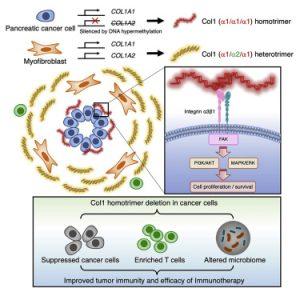In a recent study, researchers have described how cancer cells can produce small amounts of collagen that form a unique matrix which effects the tumour microbiome, protecting it from the immune response (Figure 1) (READ MORE). The collagen produced is different in structure to that of normal collagen which may provide a potential therapeutic option for cancer treatment.
Collagen is a heterotrimer consisting of two chains (α1 and α2) which combine to form structure which is part of the extracellular matrix. In this present study, the researchers found that human pancreatic cell lines expressed only one of the genes encoding these chains, COL1a1.
In this present study it was found that through the loss or knockout of this cancer-specific collagen, there was a reduction in cancer progression and an enhancement of the immune response towards the tumour, leading to better tumour suppression. They also found that cancer-specific collagen causes alterations to the tumour microbiome and immune profile which led to increased tumour survival outcomes as there was a decrease in myeloid-derived suppressor cells (MDSCs) and an increase in the T cell population. However, they observed the opposite when altering the microbiome composition through antibiotic administration.
In short, cancer-specific collagen may provide a potential therapeutic target for the treatment of certain cancers.
Journal article: Chen, Y., et al., 2022. Oncogenic collagen I homotrimers from cancer cells bind to α3β1 integrin and impact tumor microbiome and immunity to promote pancreatic cancer. Cancer Cell.
Summary by Stefan Botha











